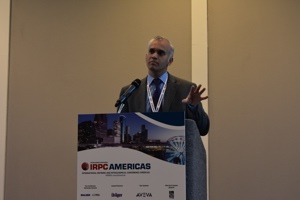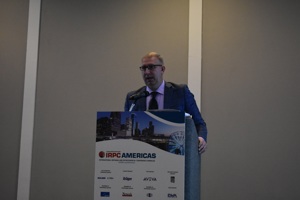IRPC '19: Keynote speakers tackle shifts in HPI landscape
Adrienne Blume, Executive Editor, Hydrocarbon Processing
HOUSTON—Day 1 of Hydrocarbon Processing's International Refining and Petrochemical Conference (IRPC)—Americas opened with keynotes from Paul Coppola, President and Chief Investment Strategy Officer for Meridian Energy Group; and Dr. Madhav Acharya, Technology-to-Market Advisor at the Advanced Research Projects Agency—Energy (ARPA-E) at the U.S. Department of Energy.
Integration: more than the sum of its parts. Controlling as many of the variables as possible in the refining process to maximize process efficiency is essential, said Mr. Coppola. "We spent a lot of time thinking about what could be fixed, and how to fix it better … We found ways to make useful components more efficient. Thinking outside the box is key."
"What we've tried to do is bring people in from all parts from the business community," Coppola continued. "This means engineers of all types—not just refining engineers, but also people who have worked offshore; smart technology people who can incorporate artificial intelligence, think ahead and implement multiple derivatives; and others. All of these people work together to help generate a bigger answer."
Meridian uses several principles to analyze integration and optimization projects at process plants. "Is it commercial, is it feasible, and is it theoretical and practical? Integration is greater than the sum of its parts … You have to put your money where your mouth is," Coppola said.
In that vein, Meridian's ROCET® program is an innovative software program for the downstream industry that involves a collaboration between proven digital and operational technologies combined with administrative and financial control software. Meridian's roadmap to digital transformation includes planning a digital twin for completion during EPC, and ensuring that the development consists of a dynamic simulation of the entire plant, Coppola noted.
Impending transformation in the HPI. Dr. Acharya deemed the outlook for the refining sector as "good." A large number of refineries are planned to be built. Petrochemicals is driving the majority of investments in the hydrocarbon processing industry (HPI) worldwide. Saudi Aramco alone has announced $100 B in refining sector investments across the world, Acharya said.

Two disruptors in the HPI are decarbonatization and singularity, Acharya explained. Decarbonization looks at how to produce and deliver the same products and services with a lower carbon footprint. Decarbonization of electricity is less difficult than decarbonization of refining and petrochemicals, due to the number of products being produced from many different components in the latter energy processes. Producers can control the amount of emissions from the production process, but they cannot control the emissions created by end users of these products, Acharya noted.
Circularity moves from a linear production model that generates waste products, to a circular model that reuses those waste products so that they never leave the value chain. Circularity will impact products that may not produce much emissions, but do not easily degrade, meaning they remain in the environment for a long time. Large-scale bioalternative energies are under investigation to replace portions of plastics use.
"There will be a big push toward reducing or reusing a lot of the products that we use today," said Acharya. Over the next 10–20 years, there will be a shift in the nature of products to determine which products can be replaced or reduced, and which products are essential." What does this mean for refiners and chemical producers?
Two possible outcomes that will have major implications for the future include: A scenario of "fragmentation" that focuses on certain products. Over time, tightly integrated facilities will give way to facilities that produce specific products.
A second scenario is "flexible refining," where refineries would run a variety of feedstocks including crude oil, CO2, waste, biofeedstocks, etc. This scenario would enable refineries to better accommodate future shifts in production and demand that will see a greater focus on chemicals and a smaller focus on fuels and lubes.
"There's a great opportunity for you to kickstart these transformations in the refining and chemical industries," Acharya said, addressing IRPC attendees. "Folks like yourself have the financial muscle to go out and make this happen.
IRPC is taking place at the Crowne Plaza near NRG Center in Houston, Texas through September 26.

- RWE strengthens partnerships with ADNOC and Masdar to enhance energy security in Germany and Europe
- TotalEnergies and Mozambique announce the full restart of the $20-B Mozambique LNG project
- Venture Global wins LNG arbitration case brought by Spain's Repsol
- KBR awarded FEED for Coastal Bend LNG project
- Norway pipeline gas export down 2.3% in 2025, seen steady this year




Comments